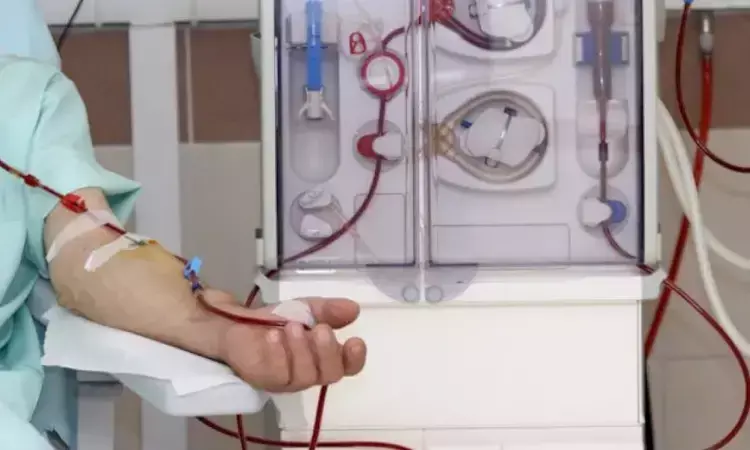- Home
- Medical news & Guidelines
- Anesthesiology
- Cardiology and CTVS
- Critical Care
- Dentistry
- Dermatology
- Diabetes and Endocrinology
- ENT
- Gastroenterology
- Medicine
- Nephrology
- Neurology
- Obstretics-Gynaecology
- Oncology
- Ophthalmology
- Orthopaedics
- Pediatrics-Neonatology
- Psychiatry
- Pulmonology
- Radiology
- Surgery
- Urology
- Laboratory Medicine
- Diet
- Nursing
- Paramedical
- Physiotherapy
- Health news
- Fact Check
- Bone Health Fact Check
- Brain Health Fact Check
- Cancer Related Fact Check
- Child Care Fact Check
- Dental and oral health fact check
- Diabetes and metabolic health fact check
- Diet and Nutrition Fact Check
- Eye and ENT Care Fact Check
- Fitness fact check
- Gut health fact check
- Heart health fact check
- Kidney health fact check
- Medical education fact check
- Men's health fact check
- Respiratory fact check
- Skin and hair care fact check
- Vaccine and Immunization fact check
- Women's health fact check
- AYUSH
- State News
- Andaman and Nicobar Islands
- Andhra Pradesh
- Arunachal Pradesh
- Assam
- Bihar
- Chandigarh
- Chattisgarh
- Dadra and Nagar Haveli
- Daman and Diu
- Delhi
- Goa
- Gujarat
- Haryana
- Himachal Pradesh
- Jammu & Kashmir
- Jharkhand
- Karnataka
- Kerala
- Ladakh
- Lakshadweep
- Madhya Pradesh
- Maharashtra
- Manipur
- Meghalaya
- Mizoram
- Nagaland
- Odisha
- Puducherry
- Punjab
- Rajasthan
- Sikkim
- Tamil Nadu
- Telangana
- Tripura
- Uttar Pradesh
- Uttrakhand
- West Bengal
- Medical Education
- Industry
Is higher Dietary Potassium Intake related to hyperkalemia or death in Adults on Hemodialysis?

According to a new study, higher potassium intake in the diet is not associated with hyperkalemia or death in hemodialysis patients. Despite a lack of evidence, dietary potassium restriction is standard practice in people receiving maintenance hemodialysis and is recommended in guidelines.
This study was conducted by Amelie Bernier-Jean and team with the objective to examine the relationship between dietary potassium intake and mortality and whether hyperkalemia mediates this relationship.
The findings of this study were published in the Clinical Journal of the American Society of Nephrology on 16th December, 2021.
In the following research The Dietary intake, death, and hospitalization in adults with end-stage kidney disease treated with Hemodialysis (DIET-HD) study included 8043 adults undergoing maintenance hemodialysis in Europe and South America. The Global Allergy and Asthma European Network food frequency questionnaire was used to determine baseline potassium intake, and time-to-event and mediation analyses were performed.
The findings of this study are:
1. At baseline, the median potassium intake was 3.5 (interquartile range, 2.5–5.0) g/d.
2. It was observed that 2921 (36%) deaths over a median follow-up of 4.0 years (25,890 person-years).
3. After controlling for baseline characteristics such as cardiac disease and food groups, dietary potassium intake was found to be unrelated to all-cause mortality (hazard ratio, 1.00; 95 percent confidence interval [CI], 0.95 to 1.05).
4. A mediation analysis revealed no link between potassium intake and mortality, either through or independent of serum potassium levels (hazard ratio, 1.00; 95 percent CI, 1.00 to 1.00 and hazard ratio, 1.01; 95 percent CI, 0.96 to 1.06, respectively).
5. Potassium intake had no effect on serum levels (0.03; 95% CI, 0.01 to 0.07 mEq/L per 1 g/d higher dietary potassium intake) or the prevalence of hyperkalemia (6.0 mEq/L) at baseline (odds ratio, 1.11; 95% CI, 0.89 to 1.37 per 1 g/d higher dietary potassium intake).
6. Hyperkalemia has been linked to cardiovascular death (hazard ratio, 1.23; 95 percent CI, 1.03 to 1.48).
In conclusion, hyperkalemia and cardiovascular death have been linked (hazard ratio, 1.23).
Reference:
Bernier-Jean, A., Wong, G., Saglimbene, V., Ruospo, M., Palmer, S. C., Natale, P., Garcia-Larsen, V., Johnson, D. W., Tonelli, M., Hegbrant, J., Craig, J. C., Teixeira-Pinto, A., & Strippoli, G. F. M. (2021). Dietary Potassium Intake and All-Cause Mortality in Adults Treated with Hemodialysis. In Clinical Journal of the American Society of Nephrology (Vol. 16, Issue 12, pp. 1851–1861). American Society of Nephrology (ASN). https://doi.org/10.2215/cjn.08360621
Medical Dialogues consists of a team of passionate medical/scientific writers, led by doctors and healthcare researchers. Our team efforts to bring you updated and timely news about the important happenings of the medical and healthcare sector. Our editorial team can be reached at editorial@medicaldialogues.in.
Dr Kamal Kant Kohli-MBBS, DTCD- a chest specialist with more than 30 years of practice and a flair for writing clinical articles, Dr Kamal Kant Kohli joined Medical Dialogues as a Chief Editor of Medical News. Besides writing articles, as an editor, he proofreads and verifies all the medical content published on Medical Dialogues including those coming from journals, studies,medical conferences,guidelines etc. Email: drkohli@medicaldialogues.in. Contact no. 011-43720751


